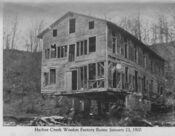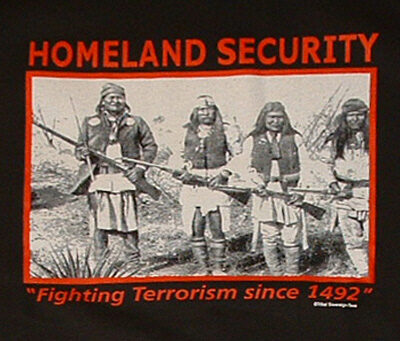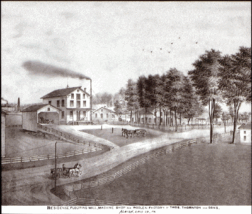|
The Family Mills
They came to America. Several of our grandfathers and uncles and cousins purchased, built, and rebuilt woolen, grain and saw mills.
 Thornton, Cass & Company Thornton, Cass & Company
In 1844, Thomas and John Thornton, John Cass (whose mother-in-law was a Coates), Joshua Jowett (another Thornton cousin) and John and Joseph Rhodes bought an old carding mill in the Six Mile Creek Factory Gulch. These Yorkshiremen, all recent arrivals, then built the Harbor Creek Woolen Factory in Harborcreek Township, on the eastern side of Erie, Pennsylvania. The Thornton, Jowett and Rhodes partners sold out to John Cass within a few years and Cass operated the mill until his death in 1874. The photo on the left of the abandoned Cass mill was taken in 1900. The caption says "Harbor Creek Woolen Factory Ruins January 23, 1900".
McCreary, Thornton Woolen Mill
This mill was in Fairview Township, just west of Erie. One Erie County history says that John Thornton, brother of Thomas, became a co-owner of the old McCreary Mill in 1848. More Thornton's than John may have been involved because the 1850 U.S. Census shows the Thomas and John Thornton families living in Fairview Township as well as Mark and Sarah Thornton Beaumont. J. Keith Thornton says "...(Thomas) Moved to Fairview in the Spring of 1848; to Girard in the Spring of 1852." (See Girard Woolen Mills below.) Sarah is thought to be a sister to Thomas and John.
Jowett's Mill in New Mexico
 Not all the Thornton mills were in northwestern Pennsylvania. Jowett Thornton, a first cousin to Thomas and John, was commissioned to go the southwestern United States in the wake of the Mexican-American War to build a woolen mill in 1848. The family story is that it was in New Mexico but New Mexico in 1848 was a very broad term. What was called New Mexico in the wake of the war eventually became the states of Arizona, Utah and New Mexico. Not all the Thornton mills were in northwestern Pennsylvania. Jowett Thornton, a first cousin to Thomas and John, was commissioned to go the southwestern United States in the wake of the Mexican-American War to build a woolen mill in 1848. The family story is that it was in New Mexico but New Mexico in 1848 was a very broad term. What was called New Mexico in the wake of the war eventually became the states of Arizona, Utah and New Mexico.
At the time and under the circumstances, there seem to be only three places in the New Mexico Territory where a woolen mill could conceivably be built; Santa Fe, Albuquerque and Las Cruces. Outside of these towns, it was Indian territory, controlled by the several Apache tribes, Navahos and Pueblos. Assuming that English investors had recruited Jewett to build the mill, Santa Fe was probably the most likely place. Like the other two towns, it was on the Rio Grande River and a number of tributary steams/rivers came out to the mountains at Santa Fe. The surrender of Geronimo in 1886, nearly 40 years later, finally ended Indian hostilities in the region. An adventurous man would have followed the 49'ers west to California as the Old Spanish Trail began in Santa Fe. His own woolen mill, with the support of his cousins in verdant Erie County, Pennsylvania seemed a better bet.
Girard Woolen Mills
Jowett Thornton left New Mexico and came to Erie with his wife and children after 1854. In 1859 in Girard, Erie County, he bought a mill from Cass & Whitfield, who in turn had bought it from "T. Thornton." The only "T. Thornton" of the time and place would have been Thomas Thornton, Jowett's first cousin who had moved in 1852 from nearby Fairview Township to Girard. Jowett and his sons Thomas and Benjamin are shown as equal partners in the 1870 census. This mill is said to have processed a ton of wool a month and operate 10 months of the year. Its principal product was yarn.
The Albion Mills
 The first mill operation was on the west side of Albion. Thomas Thornton bought Grey's Woolen Mill and his son Joshua "JC" Thornton had the saw mill on the same property. (Who actually owned what is vague in the commentaries of the time.) This mill burned in November, 1875. In the spring of 1876 Thomas built a new woolen mill on the north side of town on a mill pond that was to become known as Juliet Pond. Joshua Thornton had a grist (grain) mill on this property. The Albion woolen mill, by then owned by Thomas' son William, burned on February 27, 1906. Some of the property stayed in the family of Thomas' son William Thornton until the early 1960's. The first mill operation was on the west side of Albion. Thomas Thornton bought Grey's Woolen Mill and his son Joshua "JC" Thornton had the saw mill on the same property. (Who actually owned what is vague in the commentaries of the time.) This mill burned in November, 1875. In the spring of 1876 Thomas built a new woolen mill on the north side of town on a mill pond that was to become known as Juliet Pond. Joshua Thornton had a grist (grain) mill on this property. The Albion woolen mill, by then owned by Thomas' son William, burned on February 27, 1906. Some of the property stayed in the family of Thomas' son William Thornton until the early 1960's.
Caption: Residence, Flouring Mill, Machine Shop and Woolen Factory, Thomas Thornton and Sons
|
 Thornton, Cass & Company
Thornton, Cass & Company Not all the Thornton mills were in northwestern Pennsylvania. Jowett Thornton, a first cousin to Thomas and John, was commissioned to go the southwestern United States in the wake of the Mexican-American War to build a woolen mill in 1848. The family story is that it was in New Mexico but New Mexico in 1848 was a very broad term. What was called New Mexico in the wake of the war eventually became the states of Arizona, Utah and New Mexico.
Not all the Thornton mills were in northwestern Pennsylvania. Jowett Thornton, a first cousin to Thomas and John, was commissioned to go the southwestern United States in the wake of the Mexican-American War to build a woolen mill in 1848. The family story is that it was in New Mexico but New Mexico in 1848 was a very broad term. What was called New Mexico in the wake of the war eventually became the states of Arizona, Utah and New Mexico. The first mill operation was on the west side of Albion. Thomas Thornton bought Grey's Woolen Mill and his son Joshua "JC" Thornton had the saw mill on the same property. (Who actually owned what is vague in the commentaries of the time.) This mill burned in November, 1875. In the spring of 1876 Thomas built a new woolen mill on the north side of town on a mill pond that was to become known as Juliet Pond. Joshua Thornton had a grist (grain) mill on this property. The Albion woolen mill, by then owned by Thomas' son William, burned on February 27, 1906. Some of the property stayed in the family of Thomas' son William Thornton until the early 1960's.
The first mill operation was on the west side of Albion. Thomas Thornton bought Grey's Woolen Mill and his son Joshua "JC" Thornton had the saw mill on the same property. (Who actually owned what is vague in the commentaries of the time.) This mill burned in November, 1875. In the spring of 1876 Thomas built a new woolen mill on the north side of town on a mill pond that was to become known as Juliet Pond. Joshua Thornton had a grist (grain) mill on this property. The Albion woolen mill, by then owned by Thomas' son William, burned on February 27, 1906. Some of the property stayed in the family of Thomas' son William Thornton until the early 1960's.